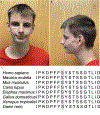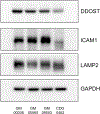DDOST-CDG: Clinical and molecular characterization of a third patient with a milder and a predominantly movement disorder phenotype
- PMID: 36214423
- PMCID: PMC9852036
- DOI: 10.1002/jimd.12565
DDOST-CDG: Clinical and molecular characterization of a third patient with a milder and a predominantly movement disorder phenotype
Abstract
Congenital disorders of glycosylation (CDG) are a group of heterogeneous inherited metabolic disorders affecting posttranslational protein modification. DDOST-CDG, caused by biallelic pathogenic variants in DDOST which encodes dolichyl-diphospho-oligosaccharide-protein glycosyltransferase, a subunit of N-glycosylation oligosaccharyltransferase (OST) complex, is an ultra-rare condition that has been described in two patients only. The main clinical features in the two reported patients include profound developmental delay, failure to thrive, and hypotonia. In addition, both patients had abnormal transferrin glycosylation. Here, we report an 18-year-old male who presented with moderate developmental delay, progressive opsoclonus, myoclonus, ataxia, tremor, and dystonia. Biochemical studies by carbohydrate deficient transferrin analysis showed a type I CDG pattern. Exome sequencing identified compound heterozygous variants in DDOST: a maternally inherited variant, c.1142dupT (p.Leu381Phefs*11), and a paternally inherited variant, c.661 T > C (p.Ser221Pro). Plasma N-glycan profiling showed mildly increased small high mannose glycans including Man0-5 GlcNAc2, a pattern consistent with what was previously reported in DDOST-CDG or defects in other subunits of OST complex. Western blot analysis on patient's fibroblasts revealed decreased expression of DDOST and reduced intracellular N-glycosylation, as evident by the biomarkers ICAM-1 and LAMP2. Our study highlights the clinical variability, expands the clinical and biochemical phenotypes, and describes new genotype, which all are essential for diagnosing and managing patients with DDOST-CDG.
Keywords: N-glycans; congenital disorders of glycosylation; movement disorders; tremor; type I CDG.
© 2022 SSIEM.
Conflict of interest statement
Conflict of Interest
Ibrahim Elsharkawi, Parith Wongkittichote, Earnest James Paul Daniel, Rodrigo Tzovenos Starosta, Keisuke Ueda, Bobby G. Ng, Hudson H. Freeze, Miao He, Marwan Shinawi declare that they have no conflict of interest.
Figures


Similar articles
-
Functional classification of DDOST variants of uncertain clinical significance in congenital disorders of glycosylation.Sci Rep. 2023 Oct 17;13(1):17648. doi: 10.1038/s41598-023-42178-y. Sci Rep. 2023. PMID: 37848450 Free PMC article.
-
DDOST mutations identified by whole-exome sequencing are implicated in congenital disorders of glycosylation.Am J Hum Genet. 2012 Feb 10;90(2):363-8. doi: 10.1016/j.ajhg.2011.12.024. Epub 2012 Feb 2. Am J Hum Genet. 2012. PMID: 22305527 Free PMC article.
-
The second DDOST-CDG patient with lactose intolerance, developmental delay, and situs inversus totalis.J Hum Genet. 2022 Feb;67(2):103-106. doi: 10.1038/s10038-021-00974-2. Epub 2021 Aug 31. J Hum Genet. 2022. PMID: 34462534
-
SSR4-CDG, an ultra-rare X-linked congenital disorder of glycosylation affecting the TRAP complex: Review of 22 affected individuals including the first adult patient.Mol Genet Metab. 2024 Jul;142(3):108477. doi: 10.1016/j.ymgme.2024.108477. Epub 2024 Apr 18. Mol Genet Metab. 2024. PMID: 38805916 Review.
-
A novel variant in ALG1 gene associated with congenital disorder of glycosylation: A case report and short literature review.Mol Genet Genomic Med. 2023 Aug;11(8):e2197. doi: 10.1002/mgg3.2197. Epub 2023 May 19. Mol Genet Genomic Med. 2023. PMID: 37204045 Free PMC article. Review.
Cited by
-
Functional classification of DDOST variants of uncertain clinical significance in congenital disorders of glycosylation.Sci Rep. 2023 Oct 17;13(1):17648. doi: 10.1038/s41598-023-42178-y. Sci Rep. 2023. PMID: 37848450 Free PMC article.
-
Single-Cell Transcriptome Analysis Reveals Development-Specific Networks at Distinct Synchronized Antral Follicle Sizes in Sheep Oocytes.Int J Mol Sci. 2024 Jan 11;25(2):910. doi: 10.3390/ijms25020910. Int J Mol Sci. 2024. PMID: 38255985 Free PMC article.
-
Progress in research on DDOST dysregulation in related diseases.Glycoconj J. 2025 Aug;42(3-4):125-135. doi: 10.1007/s10719-025-10188-9. Epub 2025 Jul 2. Glycoconj J. 2025. PMID: 40601285 Review.
References
Publication types
MeSH terms
Grants and funding
LinkOut - more resources
Full Text Sources
Medical
Miscellaneous

